Adam Smith (Mehr als 15.000 Ergebnisse)
Produktart
- Alle Produktarten
- Bücher (15.701)
- Magazine & Zeitschriften (33)
- Comics (14)
- Noten
- Kunst, Grafik & Poster (5)
- Fotografien (1)
- Karten (2)
-
Manuskripte &
Papierantiquitäten (6)
Zustand
Einband
Weitere Eigenschaften
- Erstausgabe (1.065)
- Signiert (87)
- Schutzumschlag (902)
- Angebotsfoto (4.459)
- Kein Print-on-Demand (13.163)
Gratisversand
Land des Verkäufers
Verkäuferbewertung
-
An Inquiry into the Nature and Causes of the Wealth of Nations.
Verlag: London: printed for W. Strahan; and T. Cadell, 1776, 1776
Anbieter: Peter Harrington. ABA/ ILAB., London, Vereinigtes Königreich
Erstausgabe
First edition of "the first and greatest classic of modern economic thought" (PMM). The first edition is thought to have had a press run of either 500 or 750 copies (Tribe). In his Wealth of Nations, Smith "begins with the thought that labour is the source from which a nation derives what is necessary to it. The improvement of the division of labour is the measure of productivity and in it lies the human propensity to barter and exchange. The Wealth of Nations ends with a history of economic development, a definitive onslaught on the mercantile system, and some prophetic speculations on the limits of economic control" (PMM). "The Wealth of Nations had no rival in scope or depth when published and is still one of the few works in its field to have achieved classic status, meaning simply that it has sustained yet survived repeated reading, critical and adulatory, long after the circumstances which prompted it have become the object of historical enquiry" (ODNB). Einaudi 5328; Goldsmiths' 11392; Grolier, English 57; Kress 7621; Printing and the Mind of Man 221; Rothschild 1897; Tribe 9; Vanderblue, p. 3. 2 volumes, quarto (273 x 208 mm). Contemporary calf, rebacked and recornered to style, spines richly gilt with twin black morocco labels, new endpapers. Housed in custom-made brown quarter morocco solander box by J. & S. Brockman. Bound with terminal blank leaf in Volume I and half-title in Volume II. Extremities restored, light scuffing to covers, light staining in gutter of early leaves, some foxing to contents: a very good copy.
-
An Inquiry into the Nature and Causes of the Wealth of Nations. By Adam Smith, LL.D. and F.R.S. Formerly Professor of Moral Philosophy in the University of Glasgow. In Two Volumes.
Verlag: London Printed for W. Strahan; and T. Cadell in the Strand, 1776
Anbieter: Shapero Rare Books, London, Vereinigtes Königreich
Buch Erstausgabe
First edition; 2 vols, 4to (31.5 x 24.5 cm); contemporary marginal annotations in pen, with half-title to vol. II, ad. for 'The Theory of Moral Sentiments' to title verso vol. I, publisher's ad. to vol. II 4F2 verso, errata vol. II [A2] verso, cancels vol. I M3, U3, 2Z3, 3A4 and 3O4, and vol. II D1 and 3Z4, vol. II p.288 misprinted 289; contemporary gilt-ruled sprinkled calf, rebacked but retaining original red and green morocco lettering-pieces, bottom and fore-edges untrimmed, wide margins (circa 6.5 cm), occasional spotting and soiling, minor marginal tears, mostly repaired, internal joints reinforced with tape; [12], 510; [4], 587, [1]pp; signatures: A4 a2 B-3T3 (bound without terminal blank); [A]2 B-4F2. The first edition of the 'first and greatest classic of modern economic thought' (PMM). Smith (d.1790) spent ten years writing and perfecting The Wealth of Nations, the popularity of which surpassed its publisher's expectations upon release; the estimated supply of between 500 and 750 first edition copies was exhausted within the first six months of printing, and four further editions were issued within Smith's lifetime. As the title explains, the work is fundamentally an investigation into what makes certain nations prosperous. Smith's originality lies in locating the roots of this comparative wealth in the specialisation of labour which had occurred in developed economies, for the 'annual labour of every nation is the fund which originally supplies it with all the necessaries and conveniencies of life which it annually consumes, and which consist always, either in the immediate produce of that labour, or in what is purchased with that produce from other nations' (Introduction). Our copy with contemporary marginal annotations summarising Smith's arguments as the text progresses. These aides-mémoire include key observations such as the 'Principle of division = the propensity to exchange.' (p.16), and that 'labour is the real measure of exchangeable value' (p.35). 'The history of economic theory up to the end of the nineteenth century consists of two parts: the mercantilist phase which was based not so much on a doctrine as on a system of practice which grew out of social conditions; and the second phase which saw the development of the theory that the individual had the right to be unimpeded in the exercise of economic activity. While it cannot be said that Smith invented the latter theory. his work is the first major expression of it. He begins with the thought that labour is the source from which a nation derives what is necessary to it. The improvement of the division of labour is the measure of productivity and in it lies the human propensity to barter and exchange. Labour represents the three essential elements wages, profit and rent and these three also constitute income. From the working of the economy, Smith passes to its matter 'stock' which compasses all that man owns either for his own consumption or for the return which it brings him. The Wealth of Nations ends with a history of economic development, a definitive onslaught on the mercantile system, and some prophetic speculations on the limits of economic control' (PMM). ESTC T96668; Kress 7261; Rothschild 1897; PMM 221.
-
An Inquiry into the Nature and Causes of the Wealth of Nations.
Verlag: Printed for W. Strahan; and T. Cadell, London, 1776
Anbieter: Raptis Rare Books, Palm Beach, FL, USA
Erstausgabe
First edition of Adam Smith's magnum opus and cornerstone of economic thought. Quarto, 2 volumes, bound in full brown calf, elaborately gilt-decorated spines, front and rear panels, red morocco spine labels, marbled endpapers. In near fine condition. Remarkably clean throughout with some light toning. Housed in a custom half morocco calf clamshell box, elaborately gilt decorated spines. An exceptional example of this landmark work. "First published in 1776, Adam Smith's masterpiece The Wealth of Nations, is the foundation of modern economic thought and remains the single most important account of the rise of, and the principles behind, modern capitalism. It took Smith ten years to produce An Inquiry into the Wealth of Nations. His commentary during such an incremental time, the first years of the Industrial Revolution, sought to reform outdated theories of mercantilist and physiocratic economic thought with broader concepts that we are all familiar with today, such as the division of labor, productivity, and free markets. An important theme that persists throughout the work is the idea that the economic system is automatic, and, when left with substantial freedom, able to regulate itself. This is often referred to as the â invisible hand.â The ability to self-regulate and to ensure maximum efficiency, however, is limited by a number of external forces and â privilegesâ extended to certain members of the economy at the expense of others. The 1776 publication of An Inquiry into The Wealth of Nations was the first of only five editions that were published in Adam Smithâ s lifetime and greatly influenced a number of economists and philosophers of his time and those that followed, including Jean-Baptiste Say, Alexander Hamilton, Thomas Malthus, and Ludwig von Mises. "The history of economic theory up to the end of the nineteenth century consists of two parts: the mercantilist phase which was based not so much on a doctrine as on a system of practice which grew out of social conditions; and the second phase which saw the development of the theory that the individual had the right to be unimpeded in the exercise of economic activity. While it cannot be said that Smith invented the latter theory.his work is the first major expression of it. He begins with the thought that labour is the source from which a nation derives what is necessary to it. The improvement of the division of labour is the measure of productivity and in it lies the human propensity to barter and exchange.Labour represents the three essential elements-wages, profit and rent-and these three also constitute income. From the working of the economy, Smith passes to its matter -'stock'- which encompasses all that man owns either for his own consumption or for the return which it brings him. The Wealth of Nations ends with a history of economic development, a definitive onslaught on the mercantile system, and some prophetic speculations on the limits of economic control.The Wealth of Nations is not a system, but as a provisional analysis it is complete convincing. The certainty of its criticism and its grasp of human nature have made it the first and greatest classic of modern economic thought" (PMM).
-
Autograph letter signed, to the Earl of Shelburne on the sickness of his son.
Verlag: Glasgow: 10 March 1760, 1760
Anbieter: Peter Harrington. ABA/ ILAB., London, Vereinigtes Königreich
Signiert
One of very few remaining Adam Smith autograph letters in private hands, written to the Earl of Shelburne to detail the sickness of his son Thomas Petty-Fitzmaurice, Smith's student and lodger. Mossner & Ross's census counts 232 letters written by Smith, 53 of which could not be traced (p. vii). Virtually all are in public collections. While serving as professor of logic and moral philosophy at Glasgow University, Smith shared his residence with his more prominent students, giving direct tutoring and scholastic supervision. Smith's renown was such that he attracted members of notable and aristocratic families to Glasgow: the 1st Earl of Shelburne sent his son there, rather than Oxford, on Lord Minto's recommendation. Thomas Petty-Fitzmaurice (1742 1793), the earl's youngest son, lodged and studied with Smith from 1759 to 1761. Petty-Fitzmaurice later served as MP from 1762 to 1780; his brother William served as prime minister from 1782 to 1783. "In a series of letters to Fitzmaurice's father Smith went into great detail regarding the boy's studies and behaviour, providing a number of insights into both the rigour of Smith's approach and the subjects he considered suitable for the education of a young noble. Fitzmaurice would spend two to three hours a day with Smith going over 'very regularly' the subjects he had covered in his lecture. It's clear from Smith's correspondence that the overall rigour and intensity of this schedule was an important part of his approach to teaching" (Bonnyman, p. 46). Here, Smith writes to reassure Shelburne of his son's welfare in his care. "I think it my Duty to inform your Lordship that Mr. Fitzmaurice has been for some days past ill of a slight fever, from which, however, he never appeared to be in the least danger and from which I hope he is now in a fair way of recovery. He was seized with it on Wednesday last. I missed him that forenoon from the Class, which I had never done before and upon my return to my own house, I found him lying upon his bed and complaining of a headache. I immediately sent for a Physician who ordered him to be blooded. He was a good deal relieved by the bleeding, but became very feverish that evening. He continued so all next day but the day following found himself greatly relieved in consequence of a sweat and a sound Sleep. I should have written to your Lordship that evening, that is by Fridays post, for I could have written no sooner, but he appeared to be so much better and Dr. Black assured me positively that all danger was now over, and that he would probably be quite well next day, that I resolved to wait one other post before I wrote anything that could possibly alarm your Lordship". Smith then gives a day-by-day account of Petty-Fitzmaurice's fluctuating health. He continues, "Your Lordship, perhaps, may think that as I ventured to delay writing to you by last post, I ought not to have written by this: and I shall readily acknowledge that my behaviour in this respect is not very consistent. But when Mr. Fitzmaurice had a slight relapse on Saturday evening I felt so much uneasiness for not having written to your Lordship the day before that I resolved never to expose myself to the like; your Lordship may depend upon his being treated with the utmost care and attention". Smith writes of his faith in the two doctors who attended him, who are both with him at least five times a day; they did not deem the illness serious enough to alarm Shelburne. He signs himself, "My Lord, your Lordship's most obedient obliged servant Adam Smith". The letter dates less than a year after the publication of his classic work of sentiment and sympathy, The Theory of Moral Sentiments. The letter is published in The Correspondence of Adam Smith, pp. 62 3, where the editors note Smith's solicitude parallels that shown for his later pupils, the Duke of Buccleuch and Hew Campbell Scott, when they were struck with illness. Provenance: Bowood House in Wiltshire, the estate of the Earls of Shelburne since 1754; the letter was part of the family's historic archive sold by the current Earl of Shelburne in 1994 to pay for the upkeep of the house; since then in private hands. Brian Bonnyman, Third Duke of Buccleuch and Adam Smith, 2014; Ernest Campbell Mossner & Ian Simpson Ross, The Correspondence of Adam Smith, 1987. Bifolium (folded to 228 x 186 mm), manuscript on 3 pages comprising 568 words entirely in Smith's hand, fourth page with note in hand of recipient on the letter's contents. Central fold with 10 cm split at foot, a few words a little smudged at time of writing; in very good condition.
-
Autograph letter signed.
Verlag: Glasgow, 12. III. 1760., 1760
Anbieter: Antiquariat INLIBRIS Gilhofer Nfg. GmbH, Vienna, A, Österreich
Manuskript / Papierantiquität
4to. 1½ pp. on bifolium with address on verso. To the 1st Earl of Shelburne, regarding the health of his son Thomas, at the time Smith's student and lodger: "My Lord / It gives me as much pleasure to write to your Lordship today as it gave me pain to write to you by last post. The Doctors Predictions have upon this occasion been literally and exactly fulfilled. Mr. Fitzmaurice had the night before last a very slight attack of his fever which he was relieved from by a gentle sweat; and last night he had a bleeding at the nose which Dr. Black regards as a perfect crisis. He has since been entirely free from all feverish ailments or symptoms [.]". Written in ink in a neat cursive hand, approximately 23 lines to the page, with a few corrections in the text, addressed on the verso of the second sheet, annotated: "Mr. Smith concerning my son Thomas s health". Sometime folded for posting, some light soiling along the folds. - Adam Smith was appointed professor of logic, and then of moral philosophy at Glasgow in 1751 and 1752 respectively. As a professor, Smith took students into his house, offering both supervision in studies and board and lodging. Of these students, the names of only two have come down to us: Henry Herbert, later Lord Porchester, and Thomas Petty-Fitzmaurice. In 1758 Gilbert Elliot, later Lord Minto, recommended Glasgow University rather than Oxford for the education of the younger son of the 1st Earl of Shelburne (the maternal grandson of the economist William Petty). Petty-Fitzmaurice (1742-93) had earlier been educated at Eton. For two years from 1759, Thomas Petty-Fitzmaurice lived with Adam Smith. After Glasgow he went to St Mary's Hall, Oxford, in 1761, was called to the English Bar in 1768 and became a Member of Parliament in 1762. In 1779 he set up as a linen merchant and established a bleaching factory at Llewenny in Wales, as his Irish estates were unproductive. He was reported to have lived on "the most intimate terms with Johnson, Hawkesworth and Garrick". The total number of recorded letters written by Adam Smith is surprisingly small - about 200, of which at least 24 are only known from published sources, which leaves about 176 letters surviving, virtually all in public collections. There are only 11 surviving letters of Adam Smith's predating his correspondence with Lord Shelburne. - Provenance: Bowood, home of the Earls of Shelburne. - Mossner, Correspondence of Adam Smith, no. 46 (full transcription included; deletions by Smith are not recorded).
-
Zustand: Fine. The book is in fine condition.
-
Zustand: Fine. The book is in fine condition.
-
An Inquiry into the Nature and Causes of the Wealth of Nations
Verlag: for W. Strahan and T. Cadell, London, 1778
Anbieter: Whitmore Rare Books, Inc. -- ABAA, ILAB, Pasadena, CA, USA
Zustand: Very Good. Second edition. 2 volumes, quarto (282 × 225 mm), half title in volume 2 (as called for), bound without the final blanks in each volume: [8], 510; [8], 589, [1, blank]. Contemporary tree calf, rebacked, preserving original red morocco spine labels, plain endpapers. Engraved armorial bookplate of the Leigh family of Stoneleigh Abbey ("Tout Vient de Dieu") and two Japanese bookseller's tickets to the front paste-down. Some insect damage to the leather boards, corners worn, light to moderate foxing throughout, mostly in volume 1, a few tears or blemishes, one or two signs of a contemporary reader's engagement with the text; a very good copy overall. Second edition, first published in 1776, of this classic of economic thought, the only other edition to be published in quarto format, one of 500 copies. Long considered a straight reprint, this edition in fact contains "a number of alterations large and small, some providing new information, some correcting matters of fact, some perfecting the idiom, and a large number now documenting references in footnotes" (Todd). Published in the same year as the American Declaration of Independence, Adam Smith's The Wealth of Nations was a magnum opus that shaped not only the future of a new republic, but that also urged longstanding sovereign governments to reconsider how and when they regulated markets. Arguing that economic growth comes not from government planning "but as the natural outcome of many people pursuing their own self-interest in the confines of an ordered polity," Smith encouraged economists and political policy-makers to leave free markets to their own operations and focus instead on fulfilling the duties of peace keeping, education, and public infrastructure that they owed their citizenry (The Wall Street Journal). ESTC T95117. Einaudi 5329; Goldsmiths' 11663; Kress B.154; Tribe 15; Vanderblue 3; see also PMM 221. Very Good.
-
Yuan Fu (Wealth of Nations).
Verlag: Shanghai: Nanyang gongxue yishu yuan, 1902, 1902
Anbieter: Peter Harrington. ABA/ ILAB., London, Vereinigtes Königreich
Erstausgabe
First edition in Chinese, first printing, of Smith's landmark treatise. Translated by the prominent Qing dynasty literatus Yan Fu, Smith's ideas were at the centre of late-Qing discussions concerning self-strengthening, national rejuvenation, and the future of China. By the late 19th century, Qing China struggled to compete economically with other global empires, while severe financial woes gradually sapped the stability of social institutions and the military. Wealth of Nations, alongside other Western theories such as those of Thomas Henry Huxley, offered much to Chinese officials and intellectuals preoccupied with understanding how China could adapt to modern realities and return to its traditional dominance in the face of increasingly aggressive foreign powers. Yan Fu (1854-1921) began his translation in 1897, convinced that "the system of economic liberalism developed in the book. and demonstrated in the living example of Victorian England [was] a system admirably designed to achieve the wealth and power of the state" (Schwartz, p. 6). Working from the Thorold Rogers second edition (1880), Yan spent four years on the project, including time spent adding explanatory notes, with the final product published by Shanghai's Nanyang Public Academy in 1902. Yan's teacher, Wu Rulun, provided a preface, while additional biographical material was supplied by scholarly contemporaries. Shortly after publication of Yan's translation, the famous scholar Liang Qichao extolled him as "a man whose Chinese and Western learning is unparalleled in China" (quoted in Zhu, p. 212), and the text was later re-released in two editions in 1929 and 1930 by the Commercial Press, at the time China's most important social sciences publishing house. Yan's decision to translate into Classical Chinese - a language understood only by the country's educated elite - did not dampen the influence of his achievement. While other translations have since been published in China, his translation remains much admired. Fittingly, a bust of Yan, the scholarly "heavy hitter" (Wilkinson) of the late imperial period, sits in the entrance foyer of the library of Peking University, China's oldest university and a gathering point for the country's reform-minded intellectual community in the 20th and 21st centuries. Tribe 253; Vanderblue, p. 22. Cheng-chung Lai, ed., Adam Smith across Nations, 2000; Benjamin Schwartz, "The Wealth of Nations," in Cheng, pp. 3-15; Wilkinson, Chinese History: A New Manual 5.1.5; Zhu Shaowen, "Adam Smith in China", in Tribe, pp. 209-18. 8 volumes, octavo (254 x 147 mm). Original brown paper wrappers, recently renewed gold thread xianzhuang stitching. Housed in custom folding blue cloth case. Text in Chinese. Front covers sometime annotated in Chinese with title and volume number. Wrappers relined and repaired in several places (rear wrapper of vol. V recently renewed), the odd tide mark in text. A well-preserved copy.
-
Autograph letter signed, discussing the problem of small bank notes issued by country bankers, to Thomas Joplin [?].
Verlag: London, 10. VII. 1822., 1822
Anbieter: Kotte Autographs GmbH, Roßhaupten, Deutschland
Manuskript / Papierantiquität
Quarto, 18.6 x 22.5cm, leaf edges gilt, 1 page in ink, preserved in a green cloth slip case. UnpublishedDavid Ricardo replies to a correspondent who had written to him about the practice of country bankers in relation to small bank notes. Ricardo writes that his correspondent s suggestions come too late, as the small note bill had been passed by the Commons but that he would pass them on to a member of the Lords who is interested in this subject. Ricardo states that no one is obliged to take notes from country banks if they object to the conditions of issue and that in this case this would lead to them being driven out of circulation and being substituted for coin.In Ricardo s Plan for a National Bank [written in 1823 and published in 1824 after his death] in his 14th regulation he supported the idea that £1 notes should be "issued and shall be given to any one requiring them in exchange for notes of a larger amount, if the person prefer such notes to coin. This regulation to continue in force only for one year, as far as regards London, but to be a permanent one in all the country districts". London 10 July 1822SirThe small note bill has passed theHouse of Commons & therefore your suggestion comestoo late. I agree with you that there is agreat objection to the present practice of CountryBankers, of which practice I was not aware tillI received your letter. It may indeed be urged in their favor that no one is obliged to take their notes if they do not like the conditions on which theyare issued, and I suppose that if any real inconveniencewas experienced the practical effect would be of substi-tuting coin. I will show your letter to one of theLords who takes interest in these subjects.yr.obed. serv. David RicardoFrom recent research by Professor Christophe Depoortere of the University of Paris he believes this letter was addressed to Thomas Joplin [1790?-1847], an English timber merchant and banker. Professor Depoortere writes "If I am right, this means you are in possession of the only known letter of Ricardo to Joplin."1) Historical evidencesRicardo starts his letter by "Sir" and finishes by "yr.obed. serv.". Those formal introduction and ending are quite cold and rather unusual in Ricardo s correspondence. Indeed, when he his acquainted with his correspondent, Ricardo usually starts by "Dear Sir", "My dear Sir" or "My dear Malthus, My dear Trower " There is actually only two correspondents in volume IX of Ricardo s Works which start by "Sir" only: the first one is to Foster, Peter le Neve (letter 489), the second one to John Wheatley (letter 457). In both cases, Ricardo was not well acquainted with his correspondent.The researches I have made on the relationship between Ricardo and Joplin lead me to think that Ricardo and Joplin got acquainted with each other in 1822 but not earlier and your letter could be Ricardo s answer to the first (or one of the first) letter addressed to him by Joplin.In February 1822, Joplin published a pamphlet: An Essay on the General Principles and Present Practice of Banking in England and Scotland, with Observations upon the Justice and Policy of an Immediate Alteration in the Character of the Bank of England, and the Measures to be pursued in order to effect it calling upon the inhabitants of Newcastle upon Tyne to form a Join Stock Bank (Joplin 1832:1). This pamphlet made a great impression in Newcastle, but though Joplin s efforts, it founded no support in Parliament (Joplin 1823:v). Then, he undertook to write his Outlines of a System of Political Economy written with a view to prove to Government and the Country that the Cause of the present agricultural Distress is entirely artificial; and to suggest a Plan for the Management of the Currency that he projected to publish before the next session of Parliament (Joplin 1823 xvi). This book seems to have been published during the first quarter of 1823 (O Brien 1993:38, n5 says in early march 1823). Then, wrote Joplin, he "applied, [ ] to the late Mr. Ricardo with whom I had previously become acquainted, and proposed to him, as a question peculiarly to his own, to bring the plan forward in Parliament [ ] My plan merely gave a more practical turn to his views on the subject. He had not, however it appeared, lost sight of it for a moment: for after his death [on 11 September 1823], which took place in less than six or eight months, a pamphlet was published by his friends, written by him in the mean time, entitled A Plan for a national Bank "(Joplin 1832:179). Joplin then condensed the propositions of his book in the form of a petition that was presented on 2 June 1823 to the House of Commons (O Brien1993:15). However, "with the exception, therefore, of a speech from him [Mr. Curwen who undertook to present the petition and made a speech upon it] which was neither heard nor reported, and two or three words from Mr. Ricardo, it met the general fate of petitions" (Joplin 1832:190).Joplin probably got acquainted with Ricardo in May or June 1822 (Ricardo left for his tour on the continent on 12 July 1822). Indeed, "during the dependance of the question [the renewal of the bank Charter (30 May 1822)], the author [Joplin] was in London for a couple of months" and he seems that he was looking for some support in parliament. He had "an interview with Huskisson on the Bank subject" and he wrote him a letter entitled: A few consecutive Propositions in Political Economy, which are capable of Proofs (1823:xvi) to which Huskisson answered on 6th July 1822. It is possible that he also met Ricardo during his stay in London and that he wrote to him at the same period for Ricardo s answer to an "unidentified correspondent" is dated 10 July 1822.2) Analytical evidences (remains to be written)ReferencesJoplin, Thomas (1822). An Essay on the General Principles and Present Practice of Banking in England and Scotland, with Observations upon the Justice and Policy of an Immediate Alteration in the Character of the Bank of Englan.
-
An Inquiry into the Nature and Causes of the Wealth of Nations.
Verlag: Printed for Messrs. Whitestone, Chamberlaine, W. Watson et al., London, 1776
Anbieter: Raptis Rare Books, Palm Beach, FL, USA
Erstausgabe
First Dublin edition, published the same year as the first of Adam Smithâ s magnum opus and cornerstone of economic thought. Octavo, three volumes, bound in full calf, morocco spine labels, gilt titles and tooling to the spine, gilt tooling to the front and rear panels, marbled endpapers. In very good condition. Uncommon. Adam Smith's masterpiece, first published in 1776, is the foundation of modern economic thought and remains the single most important account of the rise of, and the principles behind, modern capitalism. "The history of economic theory up to the end of the nineteenth century consists of two parts: the mercantilist phase which was based not so much on a doctrine as on a system of practice which grew out of social conditions; and the second phase which saw the development of the theory that the individual had the right to be unimpeded in the exercise of economic activity. While it cannot be said that Smith invented the latter theory.his work is the first major expression of it. He begins with the thought that labour is the source from which a nation derives what is necessary to it. The improvement of the division of labour is the measure of productivity and in it lies the human propensity to barter and exchange.Labour represents the three essential elements-wages, profit and rent-and these three also constitute income. From the working of the economy, Smith passes to its matter -'stock'- which encompasses all that man owns either for his own consumption or for the return which it brings him. The Wealth of Nations ends with a history of economic development, a definitive onslaught on the mercantile system, and some prophetic speculations on the limits of economic control.The Wealth of Nations is not a system, but as a provisional analysis it is complete convincing. The certainty of its criticism and its grasp of human nature have made it the first and greatest classic of modern economic thought" (PMM).
-
Considerations Concerning the First Formation of Languages." In: The Philological Miscellany; consisting of Select Essays from the Memoirs of the Academy of Belles Lettres at Paris, and other foreign Academies. Translated into English. With Original Pieces by the most Eminent Writers of our own Country. Vol. I.
Verlag: [London:] Printed for the Editor; and sold by T. Beckett and P. A. Dehondt, 1761, 1761
Anbieter: Peter Harrington. ABA/ ILAB., London, Vereinigtes Königreich
Erstausgabe
Rare first edition of The Philological Miscellany, all published, containing the first appearance in print of Adam Smith's "Considerations concerning the first formation of Languages, and the different genius of original and compounded Languages" (pp. 440-79), originally part of Smith's University Lectures on Rhetoric. The "Considerations" was a work of which Smith was, according to Dugald Stewart, proud: "It is an essay of great ingenuity, and on which the author himself set a high value." According to the editor of the Glasgow edition of Smith's works "it is a masterpiece of lucid exposition which any summary can only blur. Stewart's comments (Account of the Life and Writings of Adam Smith II. 44-56) are the most perceptive ever made on it. He saw that its value lies, not in the possible accuracy of the opinions, but in its being a specimen of an entirely modern kind of inquiry 'which seems, in a peculiar degree, to have interested Mr Smith's curiosity'" (Introduction to the Lectures on Rhetoric and Belles Lettres). "There is a footnote to the story of Smith's labours in perfecting an original and provocative system of morals. In 1761 he had published an extended version of his lecture on the origins of language in a little-known and short-lived review called The Philological Miscellany under the title 'Considerations Concerning the First Formation of Languages'. One can see why he wanted to do so. His theory of morals and the elaborate discussion of the process of sympathetic exchange on which it was based had presupposed the theory of language on which his theory of rhetoric was based. The theory of language he had presented to his Edinburgh and Glasgow students had been designed to show that language was essentially a vehicle for communication which had a history that was probably as old as civilization. Not only was this a subject of obvious relevance to an understanding of the workings of sympathy, it was also a means of addressing Rousseau's objection that 'not even our new grammarians' (he has Condillac in mind) could convince him that all the complexities of modern grammar could be explained in naturalistic terms. Smith disagreed. His expanded account of the theory of language was designed to show how this could be achieved by using a proper, Humean theory of the imagination. It completed his critique of Rousseau's theory of sociability and was reprinted in the third edition of The Theory of Moral Sentiments of 1763 [recte 1767] and in every subsequent edition published in his lifetime." (Phillipson, pp. 165-6). The Philological Miscellany was probably edited by William Rose of Kew, editor of The Historical Miscellany (published by Cadell), The Moral Miscellany, and The Poetical Miscellany (the latter two published by Beckett and Dehondt). Rose conducted a school at Kew and later at Chiswick. He was one of Millar's literary advisers, and Strahan and Cadell were his executors (see DNB). Smith is linked to Rose in his correspondence: in a letter to Strahan in December 1760, Smith wrote: "Remember me to Rose. Tell him I have not forgot what I promised him but have been excessively hurried. My delay, I hope, will occasion him no inconveniency: if it does I shall be excessively concerned and shall order some papers I left in England to be given to him. They are not what I would wish them, but I had rather lose a little reputation with the public as let him suffer by my negligence" (Correspondence, 54). These papers no doubt comprised the Considerations. Not listed in Tribe or Vanderblue; ESTC and WorldCat together locate 14 copies, to which we can add one in a private American library. See Ross, Life of Adam Smith, 2010, pp. 187 8 and Phillipson, Adam Smith, An Enlightened Life, 2010, p. 165f. Octavo (200 x 125 mm). Contemporary sprinkled calf, rebacked preserving the original spine with five raised bands, compartments ruled and decorated in gilt, red morocco label, red sprinkled edges. Engraved armorial bookplate of Edward Blackett, Bart., MP for Northumberland 1768-74. Rebacked with the original spine carefully laid down, first few leaves with wormtrack repaired, ink spot to one opening, page 348 misnumbered 648, two leaves with marginal chip, one with a frayed and soiled lower margin, another with the upper margin renewed; a few light spots, generally a clean copy in an attractive contemporary binding.
-
The Theory of Moral Sentiments or, An Essay Towards an Analysis of the Principles by which Men Naturally Judge Concerning the Conduct and Character, first of their Neighbours, and afterwards of themselves. To Which is Added, A Dissertation on the Origin of Languages. The Sixth Edition. In two Volumes.
Verlag: London: for A. Strahan; and T. Cadell in the Strand; and W. Creech, and J. Bell & Co. at Edinburgh, 1790, 1790
Anbieter: Peter Harrington. ABA/ ILAB., London, Vereinigtes Königreich
Signiert
The final lifetime edition of Adam Smith's first book, presented to the Scottish jurist and Enlightenment philosopher Allan Maconochie, inscribed on the title page verso, "Allan Maconochie Esquire From the Author", by a secretary, the recipient, or a family member. The recipient Allan Maconochie, Lord Meadowbank (1748-1816) was a Scottish judge and founding member of the Royal Society of Edinburgh. He was Regius Professor of Public Law and the Law of Nature and Nations in the University of Edinburgh from 1779 to 1796. His academic focus was linking political institutions to their geographic situation and the character of the peoples, a project "typical of the Scottish Enlightenment" (ODNB), culminating in his 1784 publication Essay on the Origin and Progress of the European Legislatures. The only surviving copy of notes from Smith's lectures at Glasgow originated from the Maconochie family (published under Edwin Cannan's editorship in 1896) - Ross speculates Maconochie acquired it as an aid to preparing his own course (Ross, p. 122). Mizuta details another book, a volume of Condorcet's tracts, with a similar inscription recording a presentation from Smith to Maconochie in 1790 (Mizuta, p. 15). The copy was afterwards in the library of his son James Allan Meadowbank (died 1845), with his bookplate to the front pastedown and his ownership signatures to the front free endpapers and half-titles, the latter dated 1805. The aforementioned copy of Smith's lecture notes also had his signature. The Theory of Moral Sentiments was first published in 1759. This was the first edition to be printed in two volumes, and, with Smith's extensive additions and revisions, it represents both the definitive text and the summation of his philosophical thought. Adam Smith's last recorded letter of 25 May 1790 to Thomas Cadell reveals he received 12 copies of the sixth edition, evidently for presentation (Mossner & Ross, p. 325). ESTC T90661; Goldsmiths' 14580; Kress B.1988; Jessop, p. 170; Tribe 36; Vanderblue, p. 38. Jürg Niehans, A History of Economic Theory: Classic Contributions, 1720-1980, 1994; Hiroshi Mizuta, Adam Smith's Library A Supplement to Bonar's Catalogue with a Checklist of the Whole Library, 1967; Ernest Campbell Mossner & Ian Simpson Ross, eds., The Correspondence of Adam Smith, 1987; Ian Simpson Ross, The Life of Adam Smith, 2010. 2 volumes, octavo (212 x 125 mm). Contemporary calf, rebacked, preserving red morocco labels. Extremities and inner hinges neatly restored, offsetting from turn-ins, lightly toned. A very good copy.
-
An Inquiry into the Nature and Causes of the Wealth of Nations
Verlag: Thomas Dobson, Philadelphia, 1789
Anbieter: Burnside Rare Books, ABAA, Portland, OR, USA
Erstausgabe
Zustand: Near Fine. First American Edition. First American edition of the author's magnum opus. [6, blank], 412; [4, blank], 430, [2, blank]; [2, blank], 387, [1, blank], [53, index], [3, blank] pp. Bound in full contemporary sheep, rebacked to style. Spine stamped in gilt. Red morocco spine labels, lettered in gilt. Complete in three volumes, 12mo. Near Fine with tanning to end sheets with contemporary ownership "Joseph Hall 1793 at each title; a separate former contemporary owner of W. Hamilton each volume, on top margin of advertisement in volume I, on title-page of volume II and on Contents page of volume III. Light notations. Contents lightly toned with sporadic foxing. A handsome set of the first American edition of Smith's unequivocal groundbreaking work on economic philosophy. Published thirteen years after the first edition and based on emendations and revisions made for the fourth edition, this first American edition of The Wealth of Nations significantly appeared in a momentous year in the history of the United States, which saw the convention of the first United States Congress as well as the inauguration of the country's first president. Prior to the 1789 publication, only a select and limited audience in America would have had access to copies of previous editions of The Wealth of Nations; it is therefore almost a certainty that, in the new United States, this was the first book to disseminate in a serious way Smith's important economic theories. Printed by Colonial Philadelphia printer Thomas Dobson who was most famous for the earliest printed Encyclopaedia Britannica and the first published complete Hebrew Bible in the United States.
-
Theorie der moralischen Empfindungen. Nach der dritten englischen Ausgabe übersetzt. Braunschweig: Meyer, 1770.
Anbieter: Rudi Thoemmes Rare Books, Bristol, Vereinigtes Königreich
Hardcover. Zustand: Fine. First German edition of The Theory of Moral Sentiments. 'Walther Eckstein has brought together evidence of the reception of The Theory of Moral Sentiments (TMS) in Germany. Lessing mentions the book in his celebrated work on aesthetics, Laokoon (1766), quoting a passage, in his own translation, from I.ii.1. Herder makes several references to it, the earliest one being in his aesthetic work, Kritische Wälder (1769). The first German translation was of edition 3 and appeared in 1770. The name of the translator is not stated but he was in fact Christian Günther Rautenberg, who had already translated Lord Kames s Principles of Morality and Natural Religion. It seems that Kant knew and valued TMS, judging from a letter of 1771 written to him by one Markus Herz. A passage in this letter speaks of the Englishman Smith, who, Mr. Friedländer tells me, is your favourite , and then goes on to compare the work of Smith with the first part of Home, Kritik , no doubt meaning Elements of Criticism by Henry Home, Lord Kames. As Eckstein points out, the date of 1771 (too early for the Wealth of Nations and one year after the publication of the first German translation of TMS) and the comparison with Kames show that the writer must have had TMS in mind. The passage also suggests that Herz at least, like Lessing and Herder, was interested in the relevance of TMS to aesthetics. It is unlikely, however, that Kant s own regard for the work will have been thus confined. Eckstein goes on to note that there is a passage in Kant s Reflections on Anthropology where Kant writes of the man who goes to the root of things and who looks at every subject not just from his own point of view but from that of the community and then adds, in brackets, the Impartial Spectator (der unpartheyische Zuschauer)' (Editors' Introduction to Adam Smith, The Theory of Moral Sentiments, eds D.D. Raphael & A.L. Macfie, vol. I of the Glasgow Edition of the Works and Correspondence of Adam Smith, 1982). PHYSICAL DESCRIPTION: 8vo, 576 pp., (492-3 misnumbered 502-3), contemporary brocade paper over boards, a little rubbed, hand-lettered paper spine label, occasional light foxing in upper margins, closed tears to upper margin of H3 and H4, light toning from p. 401 onwards, no stamps or inscriptions, an exceptionally beautiful copy.
-
An Inquiry into the Nature and Causes of the Wealth of Nations
Verlag: Printed for W. Strahan; and T. Cadell, London, 1784
Anbieter: Back Creek Books LLC, ABAA/ILAB, Annapolis, MD, USA
Erstausgabe
Third edition, with additions. An uncommon but particularly interesting and important edition of "Wealth of Nations," whose first edition was 1776. Smith made several additions for this edition, including a new chapter "The Conclusion of the Mercantile System." It was this particular edition (the first in octavo format) which so impressed Thomas Jefferson when he acquired a set for his own library while in France between 1784 and 1789. Adam Smith's groundbreaking treatise rejected the mercantile system and instead recognized and promoted an economics based on human nature, the division of labor, and the flow real goods and services without centralized market direction. The mercantile system had measured a nation's wealth by the physical stocks of gold and silver in its treasury, whereas Smith's radical notion was to recognize that precious metals were only the medium of exchange--that wealth actually resided in the production and exchange of goods and services in an open market. Near fine. All three volumes were rehinged and given sympathetic gilt-stamped spines, likely in the early 20th century. Original speckled calf boards retained. Mild extremity wear to board fore corners. A couple of endpapers show slight separation along inner hinges but bindings remain sturdy. Interiors nearly free of foxing. A handsome and impressive set of this important Enlightenment work. Speckled calf over boards. Octavos. 1) viii, 499; 2) vi, 518, Appendix [5]; and 3) v, [blank], 465, [blank], Index [45], [1 (ad)] pages.
-
Theory of Moral Sentiments
Erscheinungsdatum: 1761
Anbieter: Bauman Rare Books, Philadelphia, PA, USA
"SMITH, Adam. The Theory of Moral Sentiments. London: Printed for A. Millar, in the Strand; and A. Kincaid and J. Bell in Edinburgh, 1761. Octavo, contemporary full brown calf rebacked with original spine laid down, raised bands, red morocco spine label, renewed endpapers. Housed in a custom chemise and clamshell box. $16,500.Scarce and important second edition of Smith s first book, the first with Smith s major additions and revisions at the core of "his central concepts of sympathy and the impartial spectator" (Tribe, 14), a work increasingly regarded as "one of the truly outstanding books in the intellectual history of the world" (Amartya Sen).Smith's Theory of Moral Sentiments, his first book, is "one of the truly outstanding books in the intellectual history of the world" (Amartya Sen). First published in 1759, it laid the foundation for Wealth of Nations and proposed the theory repeated in the later work: that self-seeking men are often "led by an invisible hand without knowing it, without intending it, to advance the interest of the society." "The fruit of his Glasgow years Moral Sentiments would be enough to assure the author a respected place among Scottish moral philosophers, and Smith himself ranked it above the Wealth of Nations Its central idea is the concept, closely related to conscience, of the impartial spectator who helps man to distinguish right from wrong. For the same purpose, Immanuel Kant invented the categorical imperative and Sigmund Freud the superego" (Niehans, 62). Basing moral sentiment on "the power one man has of putting himself in the place of another," in contrast to Hume's idea of self-interest, "Smith was henceforth recognized as one of the first authors of the day" (DNB). With Moral Sentiments and Wealth of Nations Smith created "not merely a treatise on moral philosophy and a treatise on economics, but a complete moral and political philosophy, in which the two elements of history and theory were to be closely conjoined" (Palgrave III:412-13). To Smith, when man pursues "his own private interests, the original and selfish sentiments of Moral Sentiments, he will, in the economic realm, choose those endeavors which will best serve society. Herein lies the connection between the two great works which make them the work of a single and largely consistent theorist" (Paul, "Adam Smith," 293).This very important second edition is the first with Smith's extensive additions and revisions. Prompted by the critical insights of Hume and Sir Gilbert Elliot, Smith expanded and altered "central concepts of sympathy and the impartial spectator" (Tribe, 14). In particular, "Smith made a significant addition to his argument which indicates a shift away from reliance on public opinion This edition also explained the process of dividing oneself into two and elaborated upon the processes of self-judgment, using the impartial spectator. Overall Smith developed a more solid theory of moral judgment. The changes included theological statements. In the new material Smith refers to 'The great judge of the world' and 'his eternal justice' (203). He also writes that God created man 'after his own image' and made him 'his vicegerent upon earth' (204)" (Cockfield et al, New Perspectives, 76).Both Moral Sentiments and Wealth of Nations reflect Smith's attempts "to anchor the new science of political economy in a Newtonian universe, mechanical albeit harmonious and beneficial, in which society is shown to benefit from the unintended consequences of the pursuit of individual self-interest. There is thus a considerable affinity between the structure of Moral Sentiments and that of Wealth of Nations Smith's ethics and his economics are integrated by the same principle of self-command, or self-reliance, which manifests itself in economics in laissez faire" (Spiegel, Growth of Economic Thought, 229-231). "Strahan printed 750 copies of the second edition The title page shows the same publishers and identifies the author in the same way as the first edition" (Tribe, 14). Kress 5983. Tribe 2. See Kress 5815; Goldsmith 9537. Printing error on page 17 affecting seven words (provided in facsimile); expertly restored contemporary calf with some wear to front board. An excellent copy.".
-
Theorie der moralischen Empfindungen. Nach der dritten Englischen Ausgabe übersetzt.
Verlag: Braunschweig, Meyerische Buchhandlung 1770., 1770
Anbieter: Antiquariat Burgverlag, Wien, Österreich
Erstausgabe
Kl.-8°. 576 S. HLn. d. späten 19. Jahrhunderts mit goldgeprägtem Rückentitel. Kanten berieben, Titelblatt u. erste Seiten mit Wasserfleck, sonst gut erhalten. Flieg. Vorsatzbl. mit Besitzvermerk, Spiegel mit Buchhändlerschildchen u. Notizen. Dezente Bleistiftanmerkungen an den Rändern. Teils Paginierungsfehler. Nicht bei Graesse u. Ebert; Higgs 4860 - Seltene erste deutsche Ausgabe von Adam Smiths (1723-1790) erstem Werk "The theory of moral sentiments". Die englische Erstausgabe erschien 1759 in London. Der vorliegenden Übersetzung durch Christian Günther Rautenberg (1728-1776) liegt die dritte englische Ausgabe zugrunde. Smith beschreibt in seinem moralphilosophischen Hauptwerk die Gründe und Ursachen weshalb Menschen in der Lage sind Mitgefühl und Sympathie zu empfinden. In Bezug auf sein späteres ökonomisches Hauptwerk "The wealth of nations" (1776) kann "The theory of moral sentiments" "[.] also be seen as an explanation of the manner in which individuals are socialized to become the market-oriented and class-bound actors that set the economic system into motion." (Encyclopedia Britannica "Adam Smith"). Gewicht in Gramm: 500.
-
Compendio da obra da riqueza das nações de Adam Smith. Traduzida do original inglez, por Bento da Silva Lisboa, Official da Secretaria de Estado dos Negocios Estrangeiros e da Guerra.
Verlag: Rio de Janeiro: Na Impressão Regia, 1811-12, 1811
Anbieter: Peter Harrington. ABA/ ILAB., London, Vereinigtes Königreich
Erstausgabe
First edition in Portuguese, comprising a selection of passages from books I-IV of Smith's Wealth of Nations, translated from the third English edition of 1784 by Bento da Silva Lisboa. "Given the strong Brazilian interest in Smith's work one can better understand why the first Portuguese translation of Wealth of Nations appeared during 1811-12 in Rio de Janeiro. This is a partial translation, with the omission of Book V and half of Books I and IV. The translator's preface makes clear that Wealth of Nations was translated and studied as a doctrinal blueprint, to promote the liberalisation of economic relations between Portugal and her most important colony, fostering in this way the independent development of the Brazilian economy." (Reeder & Cardoso, "Adam Smith in the Spanish- and Portuguese- speaking world", in Tribe). Goldsmiths' 20224: Tribe 104; Vanderblue, p. 33. WorldCat finds copies at Columbia, Yale, Princeton, John Carter Brown, and the National Library of Scotland. 3 volumes bound in 1, octavo (205 x 122 mm). Contemporary sprinkled half roan and marbled paper boards, smooth spine divided into compartments by gilt roll toll, red leather label. Housed in a brown cloth flat-back box by the Chelsea Bindery. Shelf label to front pastedown and first spine compartment. Joints and corners slightly rubbed, occasional light spotting; a very good copy.
-
Essays on Philosophical Subjects. To which is prefixed, an Account of the Life and Writings of the Author; by Dugald Stewart.
Verlag: London: for T. Cadell Jun. and W. Davies, & W. Creech, Edinburgh, 1795, 1795
Anbieter: Peter Harrington. ABA/ ILAB., London, Vereinigtes Königreich
Erstausgabe
First edition, published five years after Smith's death. It is prefaced by Dugald Stewart's "Account of the Life and Writings of Adam Smith", one of the earliest biographical notices of Smith, and "until [Stewart's] Biographical Memoir of 1811. formed the basis upon which everyone drew for the biographies of Smith that began to appear in the early 19th century" (Tribe). Smith's literary executors, the medical scientist Joseph Black and geologist James Hutton, state in the advertisement that Smith's essays were intended as parts of "a connected history of the liberal sciences and elegant arts", but that Smith "long since. found it necessary to abandon that plan as far too extensive". The essays range over philosophy, aesthetics and the history of science. Most were likely written before the appearance of the Theory of Moral Sentiments in 1759, but were withheld from publication as part of Smith's "extensive plan". Stewart's "Account" was originally presented to the Royal Society of Edinburgh in two sessions during 1793. Kress lists the Dublin printing first and calls the London "another issue", while Tribe calls the Dublin edition a piracy. Neither is correct. Dublin booksellers at the time had a well-established exemption from the copyright laws and could legally reprint any new publication first published in London, without having to pay for copy. The London edition precedes the legal Dublin reprint. Einaudi 5326; Goldsmiths' 16218; Jessop, p. 172; Kress B.3038; Rothschild 1902; Tribe 55; Vanderblue, p. 43. Quarto (276 x 213 mm). Contemporary marbled calf, spine ruled and decorated gilt in compartments, black morocco label. Ownership inscription of one J. D. Erskine to head of title, monogrammed book label to front pastedown. Joints and extremities neatly restored, small worm track to lower corner of front pastedown and facing free endpaper, a crisp, clean copy.
-
Les poësies d'Horace, traduites en françois: avec des remarques et des dissertations critiques. Par le R. P. Sanadon, de la Compagnie de Jesus. Nouvelle Edition, revuë sur les corrections de l'Auteur, rétablie selon l'ordre ancien, & augmentée de quelques Piéces. Tome troisiéme.
Verlag: Amsterdam & Leipzig: Arkstée and Merkus, 1756, 1756
Anbieter: Peter Harrington. ABA/ ILAB., London, Vereinigtes Königreich
A hitherto unrecorded volume from Adam Smith's library with his bookplate centrally positioned on the front pastedown, volume 3 of an 8-volume set of Horace's poems, the text in French and Latin on facing pages, with the extensive remarks and critical notes of Noël-Étienne Sanadon of the Society of Jesus. Horace was clearly a favourite author of Smith's with thirteen different editions listed by Mizuta in his Catalogue of Smith's library (81-823), all but one of which are in Latin, the only other entry being a ten-volume set in French of Horace's works, equally with parallel Latin and French texts and notes and commentaries by Dacier. This single volume was purchased by its previous owner in the basement of Holleyman and Treacher, booksellers of Brighton, several decades ago. Not listed in Mizuta or Yanaihara. Duodecimo (168 x 95 mm). Contemporary calf, spine with five raised bands ruled in gilt, black morocco label, numbered direct in gilt. Woodcut vignettes and tailpieces, title printed in red and black. Spine ends chipped and corners worn, spine label with slight loss, free endpapers with burn marks from the leather turn ins around the edges, somewhat browned and brittle, contents crisp and clean; a very good copy.
-
Manuscrit autographe signé, préface pour la version française de Price theory
Erscheinungsdatum: 1983
Buch Erstausgabe Signiert
Pas de couverture. - s.d. (septembre 1983), 21,5x28cm, une page sur un feuillet. - There is a long-standing myth that if two economists discuss any topic, they will have at least three opinions about it. (Une légende tenace veut que, si une discussion sur un sujet quelconque s'engage entre deux économistes, il en sortira au moins trois opinions différentes.) Manuscrit autographe signé d'une page rédigée à l'encre noire sur un feuillet de papier ligné jaune et portant en exergue de la main de l'auteur : "Draft 8 - Preface for French edition 8 - Price Theory" ; nombreuses ratures et corrections. En haut à gauche du feuillet, au stylo bille, envoi autographe signé : "For Bernadette Platte, Milton Friedman". Rarissime manuscrit autographe signé du prix Nobel 1976, un des économistes les plus influents du XXe siècle, dont l'ensemble des archives est aujourd'hui conservé à la Hoover Institution Library & Archives, Stanford University. Les quelques manuscrits de Friedman encore en mains privées sont particulièrement désirables et recherchés. Important texte théorique des deux premiers paragraphes de la préface de Prix et théorie économique,première traduction française, parue en 1983 aux éditions Economica, de Price Theory. Achevée le 7 septembre 1983 à l'université de Stanford, cette version originale en anglais est totalement inédite. Price Theory, uvre majeure de Friedman (Chicago, Aldine Press, 1962) dont la version définitive fut publiée en 1976, année où Friedman obtint le Nobel, est un essai fondamental directement inspiré par ses cours à la Chicago University. Pour sa première publication en France, sept ans plus tard, Friedman entreprend donc de composer une toute nouvelle préface à l'intention de ce public moins naturellement acquis aux idées monétaristes que les Américains. Notre manuscrit, ultime version d'un texte qui nécessita huit réécritures comme en témoigne l'exergue, porte encore de multiples repentirs soulignant l'attention portée par Friedman à la réception de son travail par le lectorat français. Fer de lance de la politique économique de Ronald Reagan, la théorie des prix de Friedman est issue d'une longue tradition de penseurs français et anglo-saxons que l'économiste prend soin de citer dans ce manuscrit : « From the French physiocrats and Adam Smith to Léon Walras and Alfred Marshall to Maurice Allais and Paul Samuelson, a body of theory has been elaborated and refined that essentially all economists accept and use in their analysis of the problems for which it is relevant ». En fin connaisseur de l'esprit français, Friedman insiste ainsi sur la filiation entre le libéralisme économique de sa célèbre « école de Chicago », et la philosophie des Lumières, chère à l'intelligentsia du vieux continent. C'est d'ailleurs en hommage à cet esprit critique français qu'il ouvre sa préface par une anecdote ironique sur la relativité des théories économiques « : There is a long-standing myth that if two economists discuss any topic, they will have at least three opinions about it ». On note cependant qu'il remplace le véritable auteur de ce trait, qui n'est autre que Churchill, par un anonyme « long-standing myth ». Les reprises et biffures sur notre manuscrit montrent la tentation de Friedman d'analyser l'origine de ce mythe : « This myth rests like most myths » est biffé et remplacé par un irrévocable « Whatever small element of validity this myth may have with respect to some topics, it has none whatsoever with respect to the core of economics. price theory. ». Le second paragraphe de notre manuscrit est une apologie des théories monétaristes défendues par Friedman qui, en ce début des années 1980, viennent alors de porter leurs fruits : leur mise en application par la réserve fédérale américaine entraîne un net recul de l'inflation et une hausse historique du dollar. Au sommet de son influence, Friedman voit alors ses ouvrages, dont Price Theory, réédités, enseignés dans le monde entier et traduits en plusieurs langues. I.
-
AN INQUIRY INTO THE NATURE AND CAUSES OF THE WEALTH OF NATIONS
Verlag: London for A. Strahan and T. Cadell 1786, 1786
Anbieter: Buddenbrooks, Inc., Newburyport, MA, USA
3 volumes. An especially early printing, the fourth, only the second of the octavo editions, the last edition with any changes, includes a new preface never before printed, issued only 10 years after the first 2 vol. quarto edition. 8vo, beautiful three-quarter polished calf in fine antique style over marbled paper covered boards, red morocco lettering labels gilt, the spine in compartments separated by gilt bands, gilt central devices in the compartments. viii, 499 + errata; vi, 518, [5] Appendix + errata; v + errata, 465, (47) index + (1) ad pp. A remarkably fine and handsome set, the text blocks completely untrimmed and with the original deckled edges as issued from the printer. Bindings in excellent condition. A BEAUTIFUL SET OF THIS EXTRAORDINARY WORK. Smith's classic work was begun at Toulouse in 1763-64 where he had travelled as guardian of Henry Scott, the young duke of Buccleuch, and in the company of David Hume, historian and fellow professor at Glasgow University. The work took shape over the next ten years and was finally published in 1776. At one point during its composition, Hume wrote that Smith was "cutting himself off entirely from human society." But his labors, however severe his methods, yielded the "first and greatest classic of modern economic thought" (Printing and the Mind of Man). "[I]t may be said that the WEALTH OF NATIONS certainly operated powerfully through the harmony of its critical side with the tendencies of the half-century which followed its publication to the assertion of personal freedom and 'natural rights.' It discredited the economic policy of the past, and promoted the overthrow of institutions which had come down from earlier times, but were unsuited to modern society. As a theoretic treatment of social economy, and therefore as a guide to social reconstruction and practice in the future, it is provisional, not definitive. But when the study of its subject comes to be systematized on the basis of a general social philosophy more complete and durable than Smith's, no contribution to that final construction will be found so valuable as his" (Britannica). The fourth edition contains a special advertisement , first appearing here, in which Smith declares that he is now at liberty to acknowledge my very great obligations to Mr. Henry Hop of Amsterdam. To that gentleman I owe the most distinct, as well as liberal information, concerning a very interesting and important subject, the Bank of Amsterdam . Eighteenth century editions of Smith s magnum opus are now becoming very scarce.
-
Essays on Philosophical Subjects To Which is Prefixed, an Account of the Life and Writings of the Author; by Dugald Stewart.
Verlag: Printed for T. Cadell Jun. and W. Davies, etc., London, 1795
Anbieter: Heritage Book Shop, ABAA, Beverly Hills, CA, USA
Erstausgabe
First edition. Quarto. xcv, 244 pp. Contemporary boards, rebacked. Small library stamp on title and verso, and on last page, a small ink smudge on title, previous owner's bookplate. Overall, a very good, large paper copy, totally uncut. A posthumously published collection of essays, mainly of scientific and philosophical nature. Smith had instructed his literary editors, Joseph Black and James Hutton, to destroy almost all of his manuscript material, amounting to some sixteen volumes. These essays were exempted because the editors, perceived them to "be part of a plan he had once formed for giving a connected history of the liberal sciences and elegant arts" even though Smith had to abandon the plan because it was too extensive. HBS 66518. $10,000.
-
Essays on Philosophical Subjects To Which is Prefixed, an Account of the Life and Writings of the Author; by Dugald Stewart.
Verlag: Printed for T. Cadell Jun. and W. Davies, etc., London, 1795
Anbieter: Heritage Book Shop, ABAA, Beverly Hills, CA, USA
Erstausgabe
London: Printed for T. Cadell Jun. and W. Davies., 1795. First edition. Quarto (10 3/4 x 8 1/2 inches; 273 x 215 mm). xcv, [1, blank], 244 pp. Contemporary speckled calf. Board edges ruled in gilt. Spine ruled in gilt. Red morocco spine label, lettered in gilt. Edges speckled brown. Green silk page-marker. Board edges a bit rubbed and corners bumped. Previous owner's old ink signature on title-page, not affecting text. Occasional minor foxing or staining. Otherwise a fine copy. A posthumously published collection of essays, mainly of a scientific and philosophical nature. Smith had instructed lis literary editors, Joseph Black and James Hutton, to destroy almost all of his manuscript material, amounting to some sixteen volumes. These essays were exempted because the editors perceived them to "be part of a plan he had once formed for giving a connected history of the liberal sciences and elegant arts," even though Smith had to abandon the plan because it was too extensive. The essays illustrate the diversity of Adam Smith's interests and comprise: "The Principles which lead and direct Philosophical Enquiries; illustrated by the History of Astronomy;" "The Principles which lead and direct Philosophical Enquiries; History of the Ancient Physics;" "The Principles which lead and direct Philosophical Enquiries; History of the Ancient Logics and Metaphysics; "Of the Nature of that Imitation which takes place in what are called the Imitative Arts;" "Of the Affinity between Music, Dancing and Poetry;" "Of the Affinity between certain English and Italian Verses;" "Of the External Senses." ESTC T33499 . Goldsmiths' 16218. Kress B. 3038. Rothschild 1902. HBS 68261. $9,500.
-
Leipzig, Weidmann, 1776-78. 8vo. Bound in two nice uniform contemporary half calf bindings with five raised bands, black title-label and gilt lettering to spine. Small paper-label to upper compartment (Catalogue-number from an estate-library). Light wear to extremities, otherwise a very nice set. VIII, 632 pp" XII, 740 pp. First German edition, also being the very first overall translation, of Adam Smith's ground-breaking main work, the "Inquiry into the Nature and Causes of the Wealth of Nations". This seminal first translation of the work was undertaken by J.F. Schiller, who finished the first part of the translation in time for it to appear as soon as 1776, the same year as the original English edition. The second part appeared in 1778, the same year as the exceedingly scarce first French translation. This first German translation has been of the utmost importance to the spreading of Smith's ideas throughout Europe, and, after the true first, this must count as the most important edition of the work."The influence of the Wealth of Nations [.] in Germany [.] was so great that 'the whole of political economy might be divided into two parts - before and since Adam Smith" the first part being a prelude, and the second a sequel." (Backhouse, Roger E., The Methodology of Economics: Nineteenth-Century British Contributions, Routledge, 1997.)"The first review of the translation, which appeared in the Göttingische gelehrte Anzeigen for March 10, 1777, by J. G. H. Feder, professor of Philosophy at the University of Göttingen, was very favorable. In the words of the reviewer: "It is a classic" very estimable both for its thorough, not too limited, often far-sighted political philosophy, and for the numerous, frequently discursive historical notes," but the exposition suffers from too much repetition." (Lai, Cheng-chung. Adam Smith Across Nations: Translations and Receptions of The Wealth of Nations, Clarendon Press, UK, 2000).Until 1797, [.], the work of Adam Smith received scant attention in Germany. While Frederick II was living, Cameralism held undisputed sway in Prussia, and the economic change which began with the outbreak of the French Revolution had still not gained sufficient momentum to awake the economic theorists from their dogmatic slumber." (Lai, Cheng-chung. Adam Smith Across Nations: Translations and Receptions of The Wealth of Nations, Clarendon Press, UK, 2000).Various German economist read the german translations and was inspired by it."Christian Garve, [.], must be considered as among the important contributors to the spread of Smith's views. Himself a popularizer of philosophical doctrines, he was early attracted by the Scotch writers and became one of their foremost exponents in Germany." In 1791 Garve began a second translation of the Smith's work and in the introduction to the the translation he wrote: "It (Smith's work) attracted me as only few books have in the course of my studies through the number of new views which it gave me not only concerning the actual abject of his investigations, but concerning all related material from the philosophy of civil and social life". Georg Sartorius, August Ferdinand Lueder and, perhaps the most important economist of the period, Christian Jacob Kraus, were all important figures in the spread of Smith's thought. "The most significant of Kraus' works and that also which shows his conception of economic science most clearly is the five-volume work entitled State Economy. The first four volumes of this work are little more than a free paraphrase of the Wealth of Nations". Kraus was: "to a large extent responsible for the economic changes which took place in Prussia after 1807, in so far as they can be ascribed to Smithan influence." (Lai, Cheng-chung. Adam Smith Across Nations: Translations and Receptions of The Wealth of Nations, Clarendon Press, UK, 2000).Kraus wrote of the present volume: "[T]he world has seen no more important book than that of Adam Smith. [C]ertainly since the times of the New Testament no writing has had more beneficial results than this will have. [Smith's doctrines form] the only true, great, beautiful, just and beneficial system." (Fleischacker, Samuel , A Third Concept of Liberty, Princeton University Press, 1999.)_____________Hailed as the "first and greatest classic of modern thought" (PMM 221), Adam Smith's tremendously influential main work has had a profound impact on thought and politics, and is considered the main foundation of the era of liberal free trade that dominated the nineteenth century. Adam Smith (1723-1790) is considered the founder of Political Economy in Britain, mainly due to his groundbreaking work, the "Wealth of Nations" from 1776. The work took him 12 years to write and was probably in contemplation 12 years before that. It was originally published in two volumes in 4to, and was published later the same year in Dublin in three volumes in 8vo. The book sold well, and the first edition, the number of which is unknown, sold out within six months, which came as a surprise to the publisher, and probably also to Smith himself, partly because the work "requires much thought and reflection (qualities that do not abound among modern readers) to peruse to any purpose." (Letter from David Hume, In: Rae, Life of Adam Smith, 1895, p. 286), partly because it was hardly reviewed or noticed by magazines or annuals. In spite of this, it did evoke immense interest in the learned and the political world, and Buckle's words that the work is "in its ultimate results probably the most important book that has ever been written", and that it has "done more towards the happiness of man than has been effected by the united abilities of all the statesmen and legislators of whom history has preserved an authentic account" (History of Civilisation, 1869, I:214) well describes the opinion of a great part of important thinkers then as well as now. Kress S. 2567Goldsmith 11394Menger 521Not in Einaudi.
-
Kiøbenhavn [Copenhagen], 1779-80. 8vo. Two very nice contemporary brown half calf bindings with raised bands, gilt ornamentations and gilt leather title- and tome-labels. Volume two with a bit of wear to upper capital. Corners slightly bumped. Pencil annotations to verso of title-page in volume one" title-page in volume two mounted to cover up a small hole caused by the removal of an old owner's name. Internally very clean and bright. All in all a very nice, clean, fresh, and tight copy. Engraved (by Weise, 1784) armorial book plate to inside of front boards (Gregorius Christianus Comes ab Haxthausen). (12), 575" (8), 775, (3, - errata) pp. The extremely scarce first Danish edition of Adam Smith's seminal main work, "the first and greatest classic of modern economic thought" (PMM 221), the main foundational work of the era of liberal free trade. This publication constitutes the first Danish work worth mentioning in the history of economic thought - in spite of the great interest in political economy that dominated Danish political thought in the last quarter of the 18th century. The value of Smith's work was not immediately recognized in Denmark at the time of its appearance and a quarter of a century had to go by for its importance to be acknowledged and for Danish political economy to adapt the revolutionizing theories of Adam Smith. Few copies of the translation were published and sold, and the book is now a great scarcity. As opposed to for instance the German translation of the work, Smith concerned himself a great deal with this Danish translation. As is evident from preserved correspondence about it, he reacted passionately to it and was deeply concerned with the reaction to his work in Scandinavia (see "Correspondence of Adam Smith", Oxford University Press, 1977).- As an example, Smith writes in a letter to Andreas Holt on Oct. 26th, 1780: "It gives me the greatest pleasure to hear that Mr. Dreby has done me the distinguished honour of translating my Book into the Danish language. I beg you will present to him my most sincere thanks and most respectful Compliments. I am much concerned that I cannot have the pleasure of reading it in his translation, as I am so unfortunate as not to understand the Danish language." The translation was made by Frants Dræby (1740-1814), the son a whiskey distiller in Copenhagen, who mastered as a theologian and was then hired by the great Norwegian merchant James Collett as tutor to his son. There can be no doubt that Dræbye's relation to the Collett house had a great impact upon his interest in economics. In the middle of the 1770'ies, Dræbye accompanied Collett's son on travels throughout Europe, which took them to England in the year 1776, the same year that the "Wealth of Nations" was published for the first time. Through the Colletts, Dræbye was introduced to the mercantile environment in England and here became thoroughly acquainted with English economics and politics at the time. It is presumably here that he gets acquainted with Adam Smith's freshly published revolutionary work. When Dræbye returned to Denmark at the end of 1776, he was appointed chief of the Norwegian secretariat of the Board of Economics and Trade. He began the translation of the "Wealth of Nations" that he brought back with him from England immediately after his return."WN [i.e. Wealth of Nations] was translated into Danish by Frants Dræbye and published in 1779 (three years after the first English edition). The translation was initiated by Andreas Holt and Peter Anker, who were acquainted with Smith. Dræbye was a Dane who lived mainly in Norway, reflecting the fact that Norway was much more British-oriented than Denmark proper (Denmark and Norway were united until 1814, when Sweden took Norway away from the Danes" in 1905 Norway became an independent state). Norwegian merchants lived from exporting timber to Britain and tended on the whole to be adherents of a liberal economic policy, whereas the absolutist government in Copenhagen was more German-oriented and had economic views similar to those in contemporary Prussia." (Cheng-chung Lai (edt.): "Adam Smith Across Nations", p. (37)). The last quarter of the eighteenth century in Denmark was dominated by a lively discussion of monetary policy and the institutional framework best suited to realize that policy. There was a vital interest in questions of economic concern, and contemporary Danish sources refer to the period as "this economic age" and state things such as "never was the world more economically minded" (both from "Denmark and Norway's Economic Magazine"). During this period, Smith's revolutionary ideas did not play a major role, however, and only at the beginning of the 19th century did Danish politicians and economists come to realize the meaning of Smith's views. "Without exaggeration it can essentially be said that a quarter of a century was to pass from the time of the publication of the book in Denmark before Danish political economy fully made Adam Smith's theories and points of view its own. It took so long a time because the economic conditions as a whole in the years from 1780-1800 did not make desirable or necessary the changing of their concepts. That glorious commercial period had to pass before it was understood that we had altogether too little help in our own natural resources and that a different course was, therefore, necessary. Only when one had come so far could the new thinking find a nourishing soil so that it could develop strength with which to push aside the old ideas."(Hans Degen: "On the Danish Translation of Adam Smith and Contemporary Opinion Concerning It." Translated by Henrietta M. Larson. In: Adam Smith Across Nations, p. 51). This first Danish translation is one of the very earliest translations of "Wealth of Nations"" it is only preceded by the German (1776-78) and the extremely scarce French (1778-79). As a comparison, the Italian translation does not appear until 1790-91, th.
-
Historische und politische Betrachtungen über die Colonien besonders in Rücksicht auf die Englisch-Amerikanischen. Bound second in a volume of works on America, as listed below.
Verlag: Bern: in der Hallerschen Buchhandlung, 1779, 1779
Anbieter: Peter Harrington. ABA/ ILAB., London, Vereinigtes Königreich
Erstausgabe
Very rare first edition thus, a German translation of book IV, chapter VII of the Wealth of Nations, "Of Colonies", also issued under the title of Abhandlung über die Colonien überhaupt und die Amerikanischen besonders, with Bern, Beat Ludwig Walthard as the imprint with a different publisher's ornament on the title. The anonymous translation does not follow Johann Friedrich Schiller's German translation of the Wealth, published 1776-78. After the translation into German of the Theory of Moral Sentiments (1770), this marks Smith's third appearance in the language. Bound up with this work are three other titles relating to North America, as follow: ROBIN, Charles Cèsar. Neue Reise durch Nordamerika, in dem Jahr 1781, nebst dem Feldzuge der Armee des Herrn Grafen von Rochambeau. Aus dem Französischen übersetzt. Nüurnberg: Ernst Christoph Trattenauer, 1783. CROME, August Friedrich Wilhelm. Ueber die Grösse, Volksmenge, Clima und Fruchtbarkeit des Nordamerikanischen Freystaats. Dessau & Leipzig: in der Buchhandlung der Gelehrten, 1783. KOLB, Johann Ernst. Erzählungen von den Sitten und Schicksalen der Negersklaven: eine rührende Lektür für Menschen guter Art. Bern: in der Hallerschen Buchhandlung, 1789. Rare, with OCLC locating just four copies worldwide. See Tribe 21; not in Vanderblue. Octavo (177 x 107 mm). Contemporary half sheep and sprinkled boards, spine ruled in gilt in compartments, black leather spine label, red edges. Printed in Gothic type, woodcut head and tail pieces. Joints and corners lightly rubbed, spine label corroded with partial loss of lettering; occasional light spotting, first title page glued in gutter to front free endpaper, with small tape stains to title verso where tape has been removed.
-
Essays on Philosophical Subjects
Erscheinungsdatum: 1795
Anbieter: Maggs Bros. Ltd ABA, ILAB, PBFA, BA, London, Vereinigtes Königreich
By The Late Adam Smith, LL.D. . to which is prefixed an account of the life and writings of the author, by Dugald Stewart. First Edition. 4to (300 x 240mm). xcv, 244 pp. Contemporary half russia with marbled paper covered boards, spine lettered and ruled in gilt, edges untrimmed (extremities rubbed and bumped, upper joint cracking, heacaps missing). London: for T. Cadell Jun. and W. Davies; and W. Creech, Edinburgh, Adam Smith chose his friends James Black and William Hutton as his literary executors, after first forcing them to burn sixteen volumes of his manuscripts before his death. These essays discuss ?The Principles which lead and direct Philosophical Enquiries? illustrated by the history of astronomy, ancient physics and ancient logic and metaphysics; the nature of imitation in the imitative arts; the affinity between music, dancing and poetry, and between certain English and Italian verses; the five ?external senses? (Touching, Tasting, Smelling, Hearing, Seeing). In the ?Advertisement?, the editors [Black and Hutton] explain that ?the greater number of them [the seven essays] appeared to be parts of a plan he once had formed, for giving a connected history of the liberal sciences and elegant arts. It is long since he found it necessary to abandon that plan as far too extensive; and these parts of it lay beside him neglected until his death? Dugald Stewart's account of the life and writings of Adam Smith was originally delivered as lectures at the Royal Society of Edinburgh on 28 January and 18 March 1793 and published in their Transactions in 1794. 1000 copies were printed for sale at 15 shillings in boards. It was followed by an 8vo Dublin reprint in the same year. The only other eighteenth-century printings in English of these seven essays by Smith were at Basel (1799) and Strasburg (1799); the latter, known in only two copies, is probably a reissue of the former. Goldsmiths 16218; Rothschild 1902.
-
Kiøbenhavn [Copenhagen], 1779-80. 8vo. Two nice contemporary half calf bindings with four raised bands and gilt leather title label to spines. Volume one lacking one cm of upper part of spine. Volume two with a small tear to lower part of spine. Both volumes with light brown spotting throughout, however, mainly affecting first and last five leaves of both volumes. A fine set. (12), 575" (8), 775, (3, - errata) pp. The extremely scarce first Danish edition of Adam Smith's seminal main work, "the first and greatest classic of modern economic thought" (PMM 221), the main foundational work of the era of liberal free trade. This publication constitutes the first Danish work worth mentioning in the history of economic thought - in spite of the great interest in political economy that dominated Danish political thought in the last quarter of the 18th century. The value of Smith's work was not immediately recognized in Denmark at the time of its appearance and a quarter of a century had to go by for its importance to be acknowledged and for Danish political economy to adapt the revolutionizing theories of Adam Smith. Few copies of the translation were published and sold, and the book is now a great scarcity. As opposed to for instance the German translation of the work, Smith concerned himself a great deal with this Danish translation. As is evident from preserved correspondence about it, he reacted passionately to it and was deeply concerned with the reaction to his work in Scandinavia (see "Correspondence of Adam Smith", Oxford University Press, 1977).- As an example, Smith writes in a letter to Andreas Holt on Oct. 26th, 1780: "It gives me the greatest pleasure to hear that Mr. Dreby has done me the distinguished honour of translating my Book into the Danish language. I beg you will present to him my most sincere thanks and most respectful Compliments. I am much concerned that I cannot have the pleasure of reading it in his translation, as I am so unfortunate as not to understand the Danish language." The translation was made by Frants Dræby (1740-1814), the son a whiskey distiller in Copenhagen, who mastered as a theologian and was then hired by the great Norwegian merchant James Collett as tutor to his son. There can be no doubt that Dræbye's relation to the Collett house had a great impact upon his interest in economics. In the middle of the 1770'ies, Dræbye accompanied Collett's son on travels throughout Europe, which took them to England in the year 1776, the same year that the "Wealth of Nations" was published for the first time. Through the Colletts, Dræbye was introduced to the mercantile environment in England and here became thoroughly acquainted with English economics and politics at the time. It is presumably here that he gets acquainted with Adam Smith's freshly published revolutionary work. When Dræbye returned to Denmark at the end of 1776, he was appointed chief of the Norwegian secretariat of the Board of Economics and Trade. He began the translation of the "Wealth of Nations" that he brought back with him from England immediately after his return."WN [i.e. Wealth of Nations] was translated into Danish by Frants Dræbye and published in 1779 (three years after the first English edition). The translation was initiated by Andreas Holt and Peter Anker, who were acquainted with Smith. Dræbye was a Dane who lived mainly in Norway, reflecting the fact that Norway was much more British-oriented than Denmark proper (Denmark and Norway were united until 1814, when Sweden took Norway away from the Danes" in 1905 Norway became an independent state). Norwegian merchants lived from exporting timber to Britain and tended on the whole to be adherents of a liberal economic policy, whereas the absolutist government in Copenhagen was more German-oriented and had economic views similar to those in contemporary Prussia." (Cheng-chung Lai (edt.): "Adam Smith Across Nations", p. (37)). The last quarter of the eighteenth century in Denmark was dominated by a lively discussion of monetary policy and the institutional framework best suited to realize that policy. There was a vital interest in questions of economic concern, and contemporary Danish sources refer to the period as "this economic age" and state things such as "never was the world more economically minded" (both from "Denmark and Norway's Economic Magazine"). During this period, Smith's revolutionary ideas did not play a major role, however, and only at the beginning of the 19th century did Danish politicians and economists come to realize the meaning of Smith's views. "Without exaggeration it can essentially be said that a quarter of a century was to pass from the time of the publication of the book in Denmark before Danish political economy fully made Adam Smith's theories and points of view its own. It took so long a time because the economic conditions as a whole in the years from 1780-1800 did not make desirable or necessary the changing of their concepts. That glorious commercial period had to pass before it was understood that we had altogether too little help in our own natural resources and that a different course was, therefore, necessary. Only when one had come so far could the new thinking find a nourishing soil so that it could develop strength with which to push aside the old ideas."(Hans Degen: "On the Danish Translation of Adam Smith and Contemporary Opinion Concerning It." Translated by Henrietta M. Larson. In: Adam Smith Across Nations, p. 51). This first Danish translation is one of the very earliest translations of "Wealth of Nations"" it is only preceded by the German (1776-78) and the extremely scarce French (1778-79). As a comparison, the Italian translation does not appear until 1790-91, the Spanish 1792, the Swedish 1800-1804, the Russian 1802, etc.Adam Smith Across Nations: A4 - nr. 1. "All five books were translated" appears to be a complete translation. The long letter from Governor Pownall to Adam Smith (25 Sept.


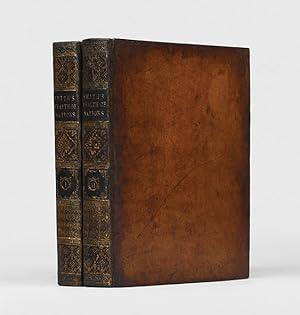
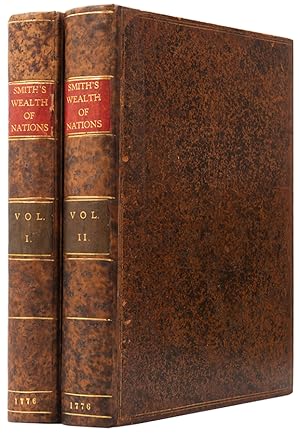

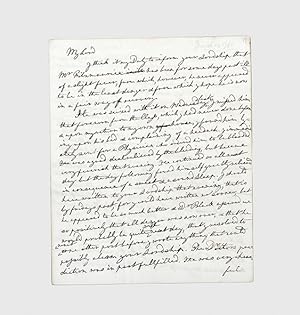
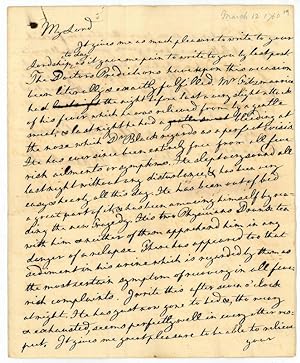

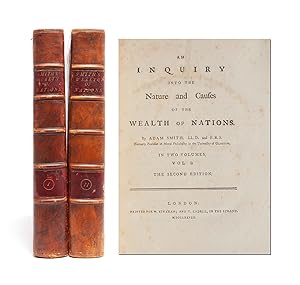

![Bild des Verkäufers für Autograph letter signed, discussing the problem of small bank notes issued by country bankers, to Thomas Joplin [?]. zum Verkauf von Kotte Autographs GmbH](https://pictures.abebooks.com/inventory/md/md22709715850.jpg)
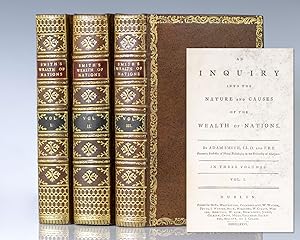
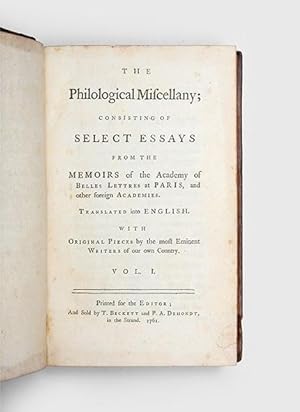
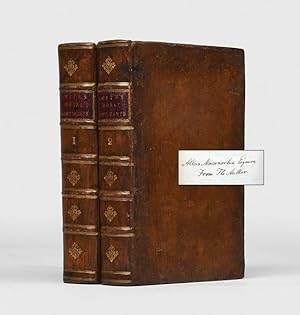
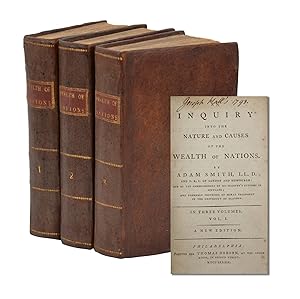

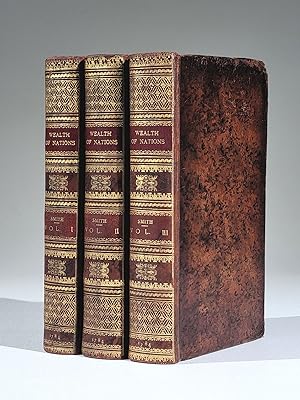
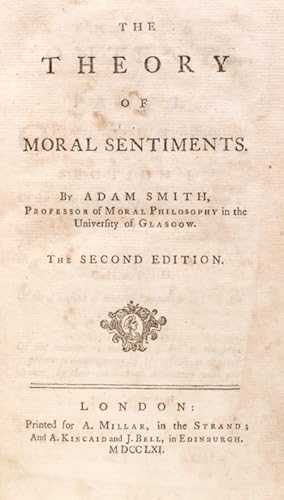
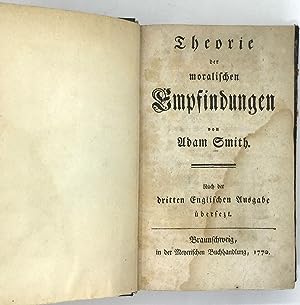

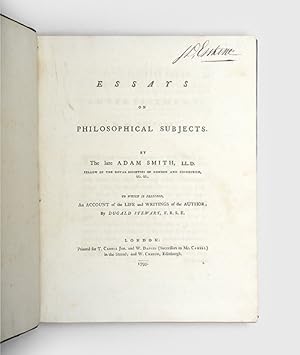

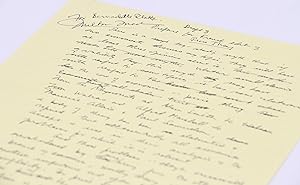
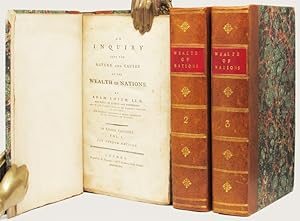
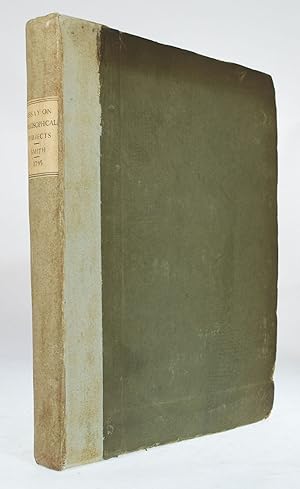
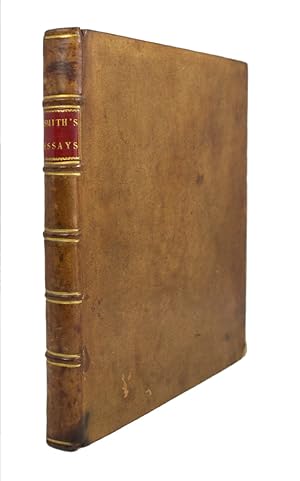
![Bild des Verkäufers für Untersuchung der Natur und Ursachen von Nationalreichthümern, Aus dem Englischen. 2 Bände. - [THE SEMINAL FIRST TRANSLATION OF 'WEALTH OF NATIONS'] zum Verkauf von Lynge & Søn ILAB-ABF](https://pictures.abebooks.com/inventory/md/md31655727520.jpg)
![Bild des Verkäufers für Undersøgelse om National-Velstands Natur og Aarsag. Af det Engelske oversat og med nogle Anmærkninger oplyst af Dræbye. 2 Deele. [Anden Deel:] Hertil er føiet Gourvenør Pownals Brev til Forfatteren i hvilket nogle af de i dette Værk fremsatte Læresætn. - [FIRST DANISH EDITION OF "THE WEALTH OF NATIONS"] zum Verkauf von Lynge & Søn ILAB-ABF](https://pictures.abebooks.com/inventory/md/md8818962796.jpg)
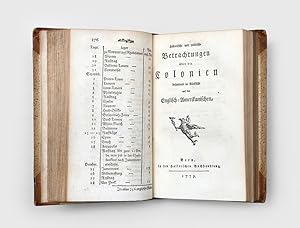
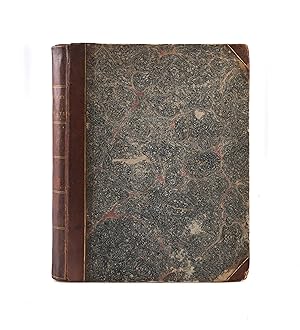
![Bild des Verkäufers für Undersøgelse om National-Velstands Natur og Aarsag. Af det Engelske oversat og med nogle Anmærkninger oplyst af Dræbye. 2 Deele. [Anden Deel:] Hertil er føiet Gourvenør Pownals Brev til Forfatteren i hvilket nogle af de i dette Værk fremsatte Læresætn. - [FIRST DANISH EDITION OF "THE WEALTH OF NATIONS"] zum Verkauf von Lynge & Søn ILAB-ABF](https://pictures.abebooks.com/inventory/md/md13507646413.jpg)